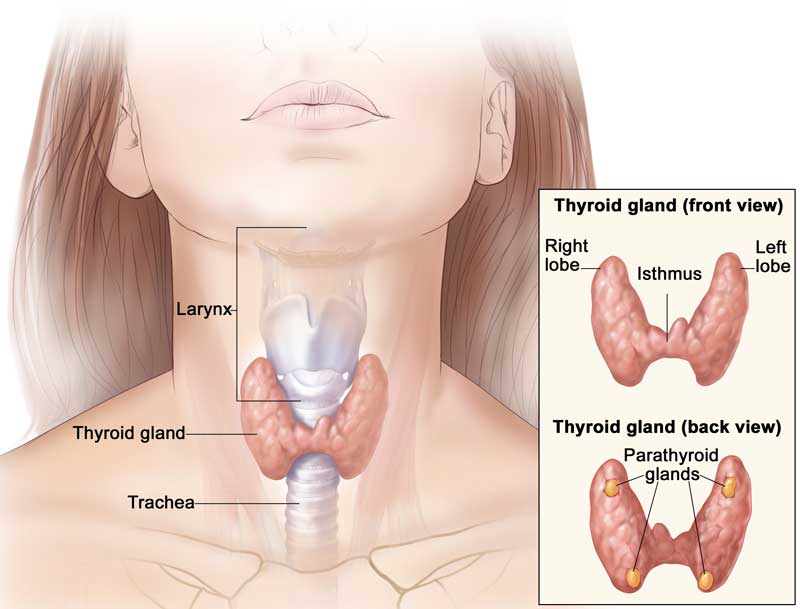What Is The Thyroid Gland?
The thyroid is an endocrine gland located at the front of the neck below the larynx and around the trachea. Iodine, an element found in many foods, is taken up by the thyroid to produce thyroid hormone. Thyroid disorders are very common. Although small, the thyroid plays a large role in producing hormones that every cell in your body relies on for the proper conversion of calories and oxygen to energy. In other words, metabolism regulation is dependent on thyroid function and the condition of your thyroid gland. This gland secretes essential hormones called thyroid hormones that are responsible for proper growth and development, balanced metabolism, and proper regulation of your body’s temperature.
- The thyroid is an endocrine gland located at the front of the neck below the larynx and around the trachea
- Iodine, an element found in many foods, is taken up by the thyroid to produce thyroid hormone
- Thyroid disorders are very common
- Many people have an undiagnosed thyroid problem
- Women are especially at risk for having unrecognised thyroid problems especially if they have a history of diabetes, rheumatoid arthritis, pernicious anaemia, prematurely gray hair, vitiligo or other autoimmune disease
About the thyroid gland
What are thyroid hormones?
- The two kinds of thyroid hormones made are Thyroxine, also known as T4, and Triiodothyronine or T3
- The thyroid gland makes and stores hormones that help regulate the heart rate, blood pressure, body temperature, and metabolism
- Thyroid hormones are essential for the function of the body
- Thyroid hormones help regulate growth and metabolism
- Thyroid hormones also help children grow and develop
Thyroid hormones help regulate
- Body weight
- Body temperature
- Heart rate
- Blood pressure
- Concentration
- Growth
What is a thyroid disease?
- Thyroid dysfunction is when the thyroid gland produces the wrong amount of thyroid hormone
- When your body’s thyroid gland speeds up it is called hyperthyroidism
- When there is too little thyroid hormone being produced it is called hypothyroidism—this is when the body’s system slows down
- If your thyroid gland isn’t working properly, neither will you
What is hypothyroidism?
- Hypothyroidism, or under activity of the thyroid gland, occurs when the thyroid gland produces less than the normal amount of thyroid hormones
- This results in the slow down of many different bodily functions
- In its earliest stage, hypothyroidism may cause few symptoms – since the body can partially compensate for a failing thyroid gland
- Hyperthyroidism develops when the body is exposed to excessive amounts of thyroid hormone – resulting in a hyperthyroid state
- This disorder occurs in almost one percent of the population and affects women 5 to 10 times more often than men
- In its mildest form, hyperthyroidism may not cause recognizable symptoms
- More often, however, the symptoms are discomforting and disabling
- When hyperthyroidism develops, a goitre (enlargement of the thyroid) usually is present and may be associated with some or many of the following symptoms
If you have any questions about thyroid or parathyroid surgery, you should speak to your local doctor, who will arrange to contact your thyroid surgeon.

